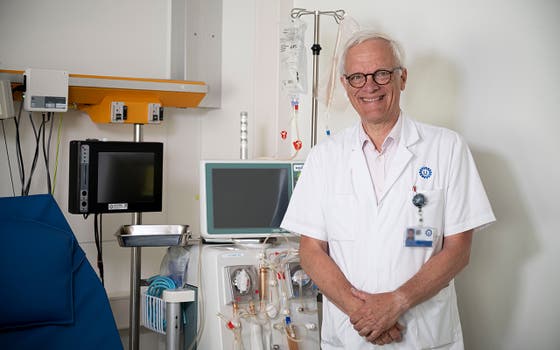Major step forward in treating patients with kidney failure

Research shows that high-dose hemodiafiltration reduces the risk of death in kidney failure.
Researchers have shown that a new dialysis method, hemodiafiltration, is a better therapy for patients with kidney failure than hemodialysis. With this dialysis therapy, the risk of death decreases by 23 percent. This is according to a European study led by Peter Blankestijn, nephrologist, and Michiel Bots, MD-epidemiologist from UMC Utrecht. The results of this study appear today in The New England Journal of Medicine. It is a major step forward in the treatment of patients with kidney failure. It is expected to lead to wider global application of hemodiafiltration.
Lees artikel in het Nederlands >
Kidney failure is a common chronic non-communicable disease. Around 4 million worldwide undergo dialysis treatment. Dialysis is a treatment that removes waste products and fluids from the blood, thus partially taking over the function of the kidneys. Hemodialysis is the most widely used dialysis method, used in 80% of patients by the end of 2021. Despite this treatment, about 10 percent of treated patients still die each year. This makes kidney failure as serious a condition as certain cardiovascular diseases.
Reduced risk of dying
European research now shows that a relatively new dialysis method, high dose hemodiafiltration, is a better therapy for patients with kidney failure than hemodialysis. With this dialysis therapy, the risk of death decreases by 23 percent compared to the usual hemodialysis treatment. Hemodiafiltration is a modified form of hemodialysis in which waste products are filtered through a pressure differential in addition to diffusion. This causes hemodiafiltration to remove more waste products than hemodialysis. Available data show that the benefit of hemodiafiltration depends on the treatment dose. Previous studies could not provide a definitive answer as to whether high-dose hemodiafiltration offers any benefit.
Benefits of hemodiafiltration
High-dose hemodiafiltration offers kidney patients a greater probability of survival. "This dialysis therapy has the same frequency and duration as hemodialysis, namely 4 to 5 hours three times a week," Peter Blankestijn explains. "It is therefore easy to apply in practice. The results of our study are an important step forward in the treatment of patients with kidney failure. Hemodiafiltration is expected to become much more widely used worldwide from now on. Perhaps it might replace hemodialysis as the standard."
Peter Blankestijn: "The aim of this study was to investigate whether consistently administering a high dose in hemodiafiltration actually has a beneficial effect on treatment." In a randomized-controlled trial, the CONVINCE study compared the use of high-dose hemodiafiltration with hemodialysis in patients with renal failure. 1360 patients with kidney failure were randomly assigned to high-dose hemodiafiltration or hemodialysis. The risk of death between the two treatment groups was compared. A high dose could be achieved in the vast majority of patients. This study as well as previous studies did not raise concerns about the safety of hemodiafiltration as a treatment.
European cooperation
The CONVINCE study was conducted with eight partners at 61 centers in 8 European countries. Involved have been the Departments of Nephrology & Hypertension, and the Julius Center of UMC Utrecht, Julius Clinical, University College London, George Institute (Imperial College London), University of Bari, Charité Institute of the Freie Universität in Berlin and three major international dialysis networks.
The CONVINCE study was exclusively supported by the European Commission Research & Innovation, Horizon 2020, Call H2020-SC1-2016-2017 under the topic SC1-PM-10-2017: Comparing the effectiveness of existing healthcare interventions in the adult population (grant no 754803).
Publication
Peter J. Blankestijn et al. Effect of Hemodiafiltration Compared with Hemodialysis on Mortality in Kidney Failure is published in the New England Journal of Medicine.
Disclaimer: The information in this document is provided as is and no guarantee or warranty is given that the information is fit for any particular purpose. The user thereof uses the information at its sole risk and liability. The opinions expressed in the document are of the authors only and in no way reflect the European Commission’s opinions.

